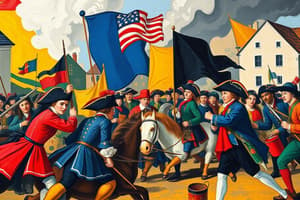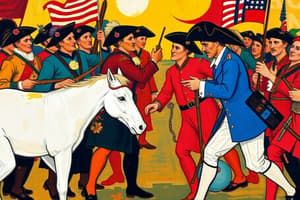Podcast
Questions and Answers
What was the main reason for the Proclamation of 1763?
What was the main reason for the Proclamation of 1763?
- To give representation to American colonists in Parliament
- To settle colonists beyond the Appalachian Mountains
- To impose taxes on American colonists
- To restrict American colonists from settling beyond the Appalachian Mountains (correct)
What was the outcome of the Boston Massacre in 1770?
What was the outcome of the Boston Massacre in 1770?
- The British soldiers were arrested
- The American colonists were forced to pay a fine
- The British government apologized to the colonists
- Five American colonists were killed (correct)
What was the main purpose of the Boston Tea Party in 1773?
What was the main purpose of the Boston Tea Party in 1773?
- To protest the British taxation policies (correct)
- To prepare for the American Revolutionary War
- To celebrate the British government's decision to reduce taxes
- To show loyalty to the British crown
What was the significance of the First Continental Congress in 1774?
What was the significance of the First Continental Congress in 1774?
Who was the author of the Declaration of Independence?
Who was the author of the Declaration of Independence?
What was the outcome of the American Revolutionary War?
What was the outcome of the American Revolutionary War?
What was the significance of the Treaty of Paris in 1783?
What was the significance of the Treaty of Paris in 1783?
What was established by the United States Constitution in 1787?
What was established by the United States Constitution in 1787?
Flashcards are hidden until you start studying
Study Notes
Causes of the American Revolution
- Proclamation of 1763: Forbidden American colonists from settling beyond the Appalachian Mountains, leading to resentment towards British rule.
- Taxation without representation: British imposed taxes on colonists without giving them representation in Parliament, violating their rights as Englishmen.
- Boston Massacre (1770): Tensions between British soldiers and American colonists escalated into violence, killing five colonists.
- Boston Tea Party (1773): Colonists dressed as Native Americans boarded British ships and threw tea into the harbor to protest taxation.
Events of the American Revolution
- First Continental Congress (1774): Delegates from 12 colonies met to coordinate a unified response to British rule.
- American Revolutionary War (1775-1783): Colonies declared independence and fought against British forces, with the help of France.
- Declaration of Independence (1776): Written by Thomas Jefferson, it formally declared the 13 colonies independent states.
- Surrender at Yorktown (1781): British General Charles Cornwallis surrendered, marking a decisive American victory.
Key Figures
- George Washington: Led the Continental Army to victory and became the first President of the United States.
- Thomas Jefferson: Author of the Declaration of Independence and third President of the United States.
- Patrick Henry: Famous for his "Give me liberty or give me death" speech, urging colonists to take a stand against British rule.
- Benjamin Franklin: Diplomat, statesman, and scientist who helped secure French support for the American cause.
Outcomes of the American Revolution
- Treaty of Paris (1783): Officially ended the war and recognized American independence.
- United States Constitution (1787): Established the framework of the federal government and the principles of the American system.
- New Nation: The American Revolution created a new nation, founded on the principles of liberty, democracy, and individual rights.
Causes of the American Revolution
- The Proclamation of 1763 restricted American colonists from settling beyond the Appalachian Mountains, sparking resentment towards British rule.
- The British government imposed taxes on colonists without giving them representation in Parliament, violating their rights as Englishmen and leading to widespread discontent.
- Tensions between British soldiers and American colonists escalated into violence during the Boston Massacre in 1770, resulting in the deaths of five colonists.
- The Boston Tea Party in 1773 saw colonists dressed as Native Americans board British ships and throw tea into the harbor to protest taxation.
Events of the American Revolution
- The First Continental Congress in 1774 brought together delegates from 12 colonies to coordinate a unified response to British rule.
- The American Revolutionary War lasted from 1775 to 1783, with the colonies declaring independence and fighting against British forces, aided by the French.
- The Declaration of Independence, written by Thomas Jefferson in 1776, formally declared the 13 colonies independent states.
- The American victory at the Battle of Yorktown in 1781, where British General Charles Cornwallis surrendered, marked a decisive turning point in the war.
Key Figures
- George Washington led the Continental Army to victory and became the first President of the United States.
- Thomas Jefferson authored the Declaration of Independence and later became the third President of the United States.
- Patrick Henry's famous "Give me liberty or give me death" speech in 1775 urged colonists to take a stand against British rule.
- Benjamin Franklin was a diplomat, statesman, and scientist who helped secure French support for the American cause.
Outcomes of the American Revolution
- The Treaty of Paris in 1783 officially ended the war and recognized American independence.
- The United States Constitution, established in 1787, created the framework of the federal government and enshrined the principles of the American system.
- The American Revolution resulted in the creation of a new nation, founded on the principles of liberty, democracy, and individual rights.
Studying That Suits You
Use AI to generate personalized quizzes and flashcards to suit your learning preferences.




